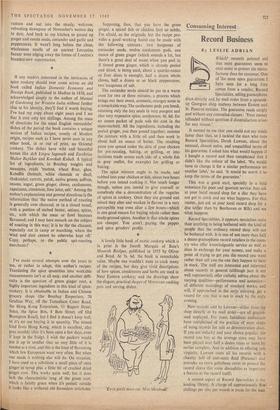E -= Please give generously to this urgent appeal for:
E._ WESTMINSTER BANK LIMITED
41 LOTHBURY, LONDON, E.C.2
of any record that is in The Gramophone classi- cal catalogue. This means that many discs have to be bought specially for the library. The scheme would be a money-loser except that it helps to sell records in the long run. Each disc indicates a current sale price (the figure is progressively lowered with each lending). A borrower can at any time buy a loan record for the price indicated less the hiring fee.
A third feature of the business is the sale of second-hand (or, more accurately, 'reduced price') records. All the discs are in perfect or near-perfect condition and prices vary from three-quarters to half the usual price. A list is sent to mail-order customers every month. The source of these records—a matter of continual interest to the record manufacturers because of their `as new' condition—is threefold. Some are bought from customers (undisguised second- hand), some are review copies (as new), others are deletions and other surplus stock purchases (new). The sale of review copies has long been a sore point with the manufacturers who, unlike book publishers, seem unwilling to regard the discs as legitimate 'perks' for the reviewer. They claim that they have to pay purchase tax on the discs sent out for review, a penalty which seems absurd and one on which the Excise men might profitably be challenged. One record company executive once claimed that it cost his firm £25,000 a year in review copies until I asked him if I could quote him in writing an article drawing attention to the greed of the Inspector in demand- ing purchase tax on goods that were not being sold.
Can the specialised record shops—offering more for the same price or less—continue to thrive? Undoubtedly the reason for the apathetic attitude of most record shops—including the West End big guns—is the fact that the disc in- dustry is founded on the sale of pop records. No one can be expected or is required to take much trouble over the sale of six-and-ninepence-worth of Helen Shapiro.
But the serious music enthusiast is asked to pay a lot for his pleasures, and deserves better service and treatment than he usually gets. That is why shops like Record Specialities must be applauded. Now it remains for someone to do a similar job for the jazz fan, whose pleasure is equally costly and whose treatment, is usually even more off- hand.
There are so many British Standards (of vary- ing value, it must be said) for consumer goods that some shoppers may get the wrong impres- sion that there is a BS number for every article sold. On the other hand, there are still a great many shoppers who are either ignorant or in- different about the existence of an officially recognised standard of quality for the things they buy. Some, indeed, would tell you that the Good Housekeeping seal was official.
There is now a four-page leaflet available from BSI (Standards House, Park Street, WI) listing most of the consumer goods for which a standard has been worked out. It is a .useful document for the conscientious shopper to carry. The question to ask, when in doubt, as the leaflet says, is: 'Is it up to British Standards?'
Postscript . .
IT has been left to a political correspondent — Francis Boyd of the Guardian — to explain why there aren't enough regular recruits for what Mr. Macmillan referred to in the House of Commons the other day as, 'not the great fighting part of the army but the administrative units.' Mr. Macmillan, a former Grenadier, was referring to such dowdy conglomerations of social pariahs as the Royal Army Service Corps, the Royal Army Ordnance Corps, the Royal Electrical and Mechanical Engineers, and so on—in much the same way as Sir Winston Churchill, a former Fourth Hussar, once drew a disparaging war-time distinction between the number of men deployed against the enemy and of those who queued up for their pay.
The very tone of Mr. Macmillan's comment gives the reason: as in so many other sectors of the national life, it is British (more specifically, I think, English) class-consciousness that is the crippling factor in Army recruiting. There is not only the great gulf, mapped by Mr. Boyd, be- tween the fighting and the servicing units; there is also, among the fighting units themselves, the gulf between the fashionable and the dreary, for the snobbery of the mess is often enough reflected in the barrack-room's intake from the recruiting office. I don't think the Brigade or the Green- jackets or the cavalry ever lack for recruits, any more than they lack eager youngsters from Sandhurst, whereas every soldier knows those regiments of the line where depressed officers, perpetually brooding over having been sent from Sandhurst to the last on their list of regimental choices, or -reluctantly drafted from other units (like Winston Churchill's first commanding offi- cer who, between the Guards and the cavalry, had served in an infantry regiment the name of which, he said, 'I never can wemember, but they have gween facings, and you get at 'em from Waterloo'), command men with no pride of regi- ment because their officers have none. I know there are those infantry regiments where a great fighting tradition triumphs over a scruffi- ness of subalterns, but there are those where it doesn't : I name no names, but there were sore hearts during the recent amalgamations in those regiments which found themselves combined, under a new name, new colours and a new cap- badge, with neighbours the officers of which they never met socially, and the other ranks of which they suspected of being better fighting men with broken bottles in a boozer than with conventional weapons on the field of battle.







































 Previous page
Previous page